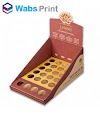If you need to design custom clothing labels, then there is a lot of directions you can go in, each is going to have their own advantages/disadvantages, especially when you are comparing cost vs. quality.
It doesn't matter if
it is sewn onto the fabric or is just an ornamental hang tag that is designed
for removal by a customer there is an elegant and significant art in the design
of custom-made clothing labels that are worth investigating.
In this article, we
will discuss some guidelines you can follow in designing your customized
clothing labels.
1. The essentials
Naturally when you
design custom clothing labels, then you have to ensure that your designs meet
the minimum specifications that the majority of consumers are used to. They include:
Brand name: The
company and brand. Make sure you have the trademark/copyright symbol when you
have a trademark registration with one.
Your website address: The
address you use must include the URL of your company's website. Inclusion of "www" is not required if your website
redirects without it, and it will make it easier to read and look nicer on your
personalized clothing label.
Your business's
number: The number that customers can call your company via. Codes for area or country are required for shipping to
markets outside of the United States.
Manufacturing "made in" details: There are legal rules in some countries that require you to disclose where the product was produced. For instance, in the case of Australia, The Australian Consumer Law (ACL) is applicable. If your product is made locally, you'd certainly want to mention this information, since it's a reason that to make your product more appealing over one of your competitors that is able to manufacture their product overseas.
Sizing: This
is an additional expense as you'd need to create several custom labels for each
size. However, it can help establish credibility for your business.
2. What do hang tags mean?
A second option for investment that can be beneficial in the creation of custom labels for your clothing is the addition of hang tags. These fancy cars are designed to be taken away by shoppers after they have made a purchase, but they're great for creating a visual impact and acting as a billboard on the shelves of retail stores.
A well-designed hang tag could serve as a wonderful method to increase the credibility of your brand as many of the top clothing brands they compete with also use them. When designing the hangtags, it is important to ensure that your company's logo and colour scheme is prominent enough to be immediately recognizable to customers who have been using it for a while and creates valuable awareness.
3. What are the care instructions?
Many fashion brands
will put instructions for care on their merchandise to ensure that customers
are aware of how to keep them in good condition and safeguard their investment. The primary benefit is that the consumer will be able to enjoy
the product longer, and it's a demonstration of trust in not wishing they'll
get it damaged and need to purchase another.
In accordance with
Dutch Label Shop when you are creating custom print clothing tags It is a good idea
to include instructions for care that outline the washing and drying steps
essential to preserve the garment's original appearance for as long as is
possible.
4. What kind of material should I use?
This will mostly
depend on your quality/cost breakdown since there are many different materials
you could choose from. Certain materials you
could choose to use for your custom clothing tags will be more suitable than
others, based on the setting in which the garments are intended to be worn.
Woven: It is the most sought-after kind of material that is used in all cases and with the subvariation that is 'woven damask' the most popular choice. Soft satin provides an extremely professional appearance and feels, however, it is possible to choose the woven taffeta option to save dollars, but it will sacrifice top quality.
Printing: Technology today allows finely-crafted customized garment labels that can be created using digital printing of logos or text on fabrics like cotton, Tyvek and polyester, satin and many more. It is the most popular method for creating quality hang tags.
PVC: The PVC
(polyvinyl chloride) is a flexible and flexible material that can also be used
for tag labels for your product. PVC is ideal for products
that are made for outdoor use since they're resistant to heat and moisture that
can be found in the outdoor environment.











0 Comments
Please do not enter any spam link in the comment box